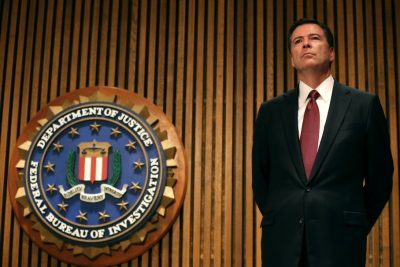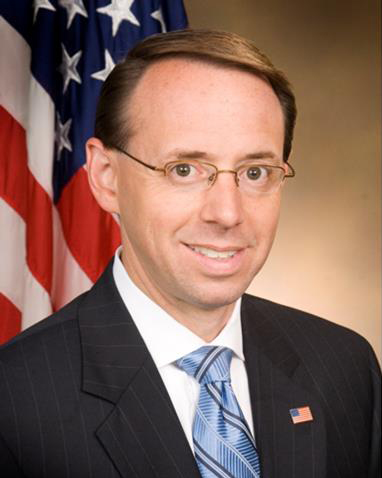Investigation into Alleged Russian Meddling: Republicans Reject Democratic Demands for Special Prosecutor
After White House dismissal of FBI director

The political crisis gripping Washington sharpened Wednesday in the aftermath of President Donald Trump’s surprise firing of FBI Director James Comey.
Trump triggered a political firestorm Tuesday when he abruptly dismissed Comey, who was heading up the most active investigation into alleged Russian government hacking of the 2016 US election and accusations of collusion between the Trump election campaign and the Kremlin.
Democrats in the Senate and other party officials lined up as a bloc on Wednesday to demand the appointment of a special prosecutor or the establishment of an independent commission to take the investigation out of the hands of Trump appointees, a demand that was firmly rejected by Republican congressional leaders.
Neither the Democratic Party nor the intelligence agencies have produced any substantive evidence to support their claims that Moscow hacked the emails of the Democratic National Committee and Hillary Clinton’s campaign director John Podesta in order to tip the election in Trump’s favor. But this is treated as undisputed fact by the bulk of the corporate media and used to agitate for a policy that leads inexorably to war with the world’s second-largest nuclear power.
The Democrats’ response to Comey’s firing has once again made clear that their opposition to Trump has nothing in common with the mass popular opposition to his assault on health care, education, environmental regulations, the rights of immigrants and democratic rights in general. It is instead focused on US imperialist foreign policy and allied with powerful factions within the intelligence and military establishment that consider Trump insufficiently aggressive in the confrontation with Russia.
To the extent that the Democrats criticize Trump’s authoritarian methods, it is out of fear that they will further discredit the entire political system and spark an uncontrollable movement of the working class.

Trump’s official rationale for the dismissal of Comey has no credibility. The letter from Deputy Attorney General Rod Rosenstein released Tuesday cites Comey’s violation of Justice Department protocol in holding a press conference last July to announce his decision not to criminally prosecute Clinton for her use of a private email server during her tenure as secretary of state, while unfairly criticizing her “extreme carelessness” in handling classified material. It also cites Comey’s extraordinary letter to Congress 11 days before Election Day announcing the reopening of the email investigation, a move that Clinton claims cost her the election.
The problem is that Trump never raised Comey’s decision to circumvent the Justice Department’s chain of command. He then congratulated the FBI director when he announced the reopening of the email probe in the run-up to the election. Nor did the official narrative explain why Comey was being fired now for things he did months ago.
Late Wednesday night, the Washington Post reported that Rosenstein threatened to resign on Tuesday night “after the narrative emerging from the White House on Tuesday evening cast him as a prime mover in the decision to fire Comey and that the president acted only on his recommendation.”
A series of developments over the past week make clear that Trump fired Comey because he was not only resisting White House pressure to end the Russia investigation, but expanding the probe.
 Press reports reveal that in recent days federal prosecutors working under Comey have issued grand jury subpoenas for records of associates of Gen. Michael Flynn, Trump’s former national security adviser. Flynn was fired in February for allegedly misleading the White House about conversations he had with the Russian ambassador to the US concerning sanctions that had been imposed by President Obama in retaliation for Russia’s supposed interference in the US election.
Press reports reveal that in recent days federal prosecutors working under Comey have issued grand jury subpoenas for records of associates of Gen. Michael Flynn, Trump’s former national security adviser. Flynn was fired in February for allegedly misleading the White House about conversations he had with the Russian ambassador to the US concerning sanctions that had been imposed by President Obama in retaliation for Russia’s supposed interference in the US election.
It has also been reported that the Senate Intelligence Committee, which is conducting its own investigation of the Russian hacking charges, sent a request to the Treasury for financial records of Flynn associates. Finally, members of Congress report that Comey told them he sent a request to Deputy Attorney General Rosenstein last week for more money to conduct the FBI investigation.
Comey was scheduled to testify Thursday before the Senate Intelligence Committee. Trump was already enraged over his March 20 congressional testimony, in which Comey announced that the FBI was conducting an investigation into the Russian hacking allegations, including charges of collusion between the Trump campaign and the Kremlin. Trump was also reportedly incensed over Comey’s failure to back up his claim that Obama had tapped the telephones at his Trump Tower campaign headquarters.
On Wednesday morning, Senate Minority Leader Charles Schumer took the unusual step of calling on all Democratic senators to be present for the opening of the session. Republican Majority Leader Mitch McConnell opened the session and flatly ruled out the appointment of a special prosecutor or other form of independent investigation.
Speaking on the floor of the Senate, Schumer in response asked,
“Were those investigations getting too close to home for the president?”
Schumer called for separate closed, and, if necessary, classified briefings of all senators by Attorney General Jeff Sessions and Deputy Attorney General Rosenstein to answer questions on the Comey firing, as well as an all-senator session to question Comey. He demanded that a special prosecutor be appointed, not by a Trump appointee in the Justice Department, but rather by a high-ranking career department official. The Democrats then froze all committee hearings, bringing the Senate virtually to a halt for the day.
Democratic National Committee Chairman Tom Perez spoke before several hundred people at a rally outside the White House called by Moveon.org that featured Russian flags and signs reading “Free Comey!” He called the firing of Comey “worse than the Saturday Night Massacre” (a reference to the Nixon Watergate scandal) and said the Senate should block confirmation of any replacement until the administration agreed to appoint a special prosecutor to investigate Trump’s ties to Russia.
The supposed representatives of the Democratic Party “left,” senators Bernie Sanders and Elizabeth Warren, rushed to solidify themselves with the anti-Russia witch hunt. Sanders issued a statement declaring,
“We need an independent investigation into the Trump campaign’s ties to Russia.”
Warren gave an interview to CNN in which she attacked Trump for his ties to the Russian “enemy” and tacked on the completely unsubstantiated charge that the Russian government was behind the pre-election hack of the campaign of Emmanuel Macron in France and was preparing similar efforts to manipulate the upcoming elections in Britain and Germany.
For the most part, the media adopted similar positions, a notable exception being the Wall Street Journal, which defended the firing of Comey. The New York Times posed an editorial Tuesday night under the headline “Trump’s Firing of Comey Is All About the Russia Inquiry.” The Times wrote,
“Mr. Comey was fired because he was leading an active investigation that could bring down a president.”
The Washington Post was even more strident, concluding its editorial with an ominous call for an independent commission to
“not merely…determine if anyone should be charged with a crime, but to develop a complete picture of Russian capabilities and intentions, as well as recommendations for mounting a defense of US democracy.”
There were some significant Republican defections from the position of full support for Trump taken by Senate Majority Leader McConnell and Speaker of the House Paul Ryan. A number of senators, including the Republican chair of the Intelligence Committee, Richard Burr, said they were “troubled” by the timing of the Comey firing. But only Lindsey Graham, who backed the firing, joined with John McCain, who denounced it, in calling for a special congressional committee to investigate alleged ties between Trump and Moscow.
At a White House press briefing Wednesday afternoon, deputy press secretary Sarah Huckabee Sanders denied that the firing of Comey had anything to do with the Russia investigation. In reply to questions about its timing, she said that Trump had been considering firing Comey ever since his election—an assertion that flatly contradicts numerous statements by Trump and his spokespeople expressing complete confidence in the FBI director.
A “big catalyst” for the final decision, she said, was Comey’s May 3 testimony before the Senate Judiciary Committee, in which he defended his decision last July to call his own press conference on the Clinton email investigation without even informing the attorney general or other Justice Department officials. Calling this circumvention of normal channels an “atrocity,” she declared,
“Director Comey made a pretty startling revelation that he had essentially taken a stick of dynamite and thrown it into the Department of Justice by going around the chain of command.”
This was perhaps her only statement that had a ring of truth. It is entirely plausible that Trump was alarmed by Comey’s testimony, interpreting it as a signal that he would not bow to pressure from the White House to rein in his investigation, prompting Trump to pull the trigger and fire him.

